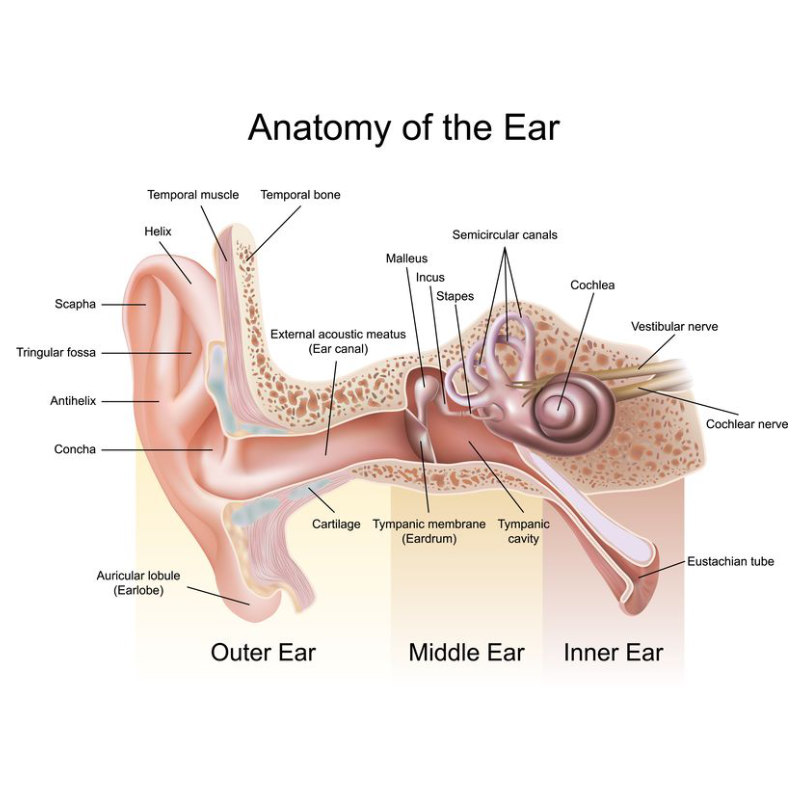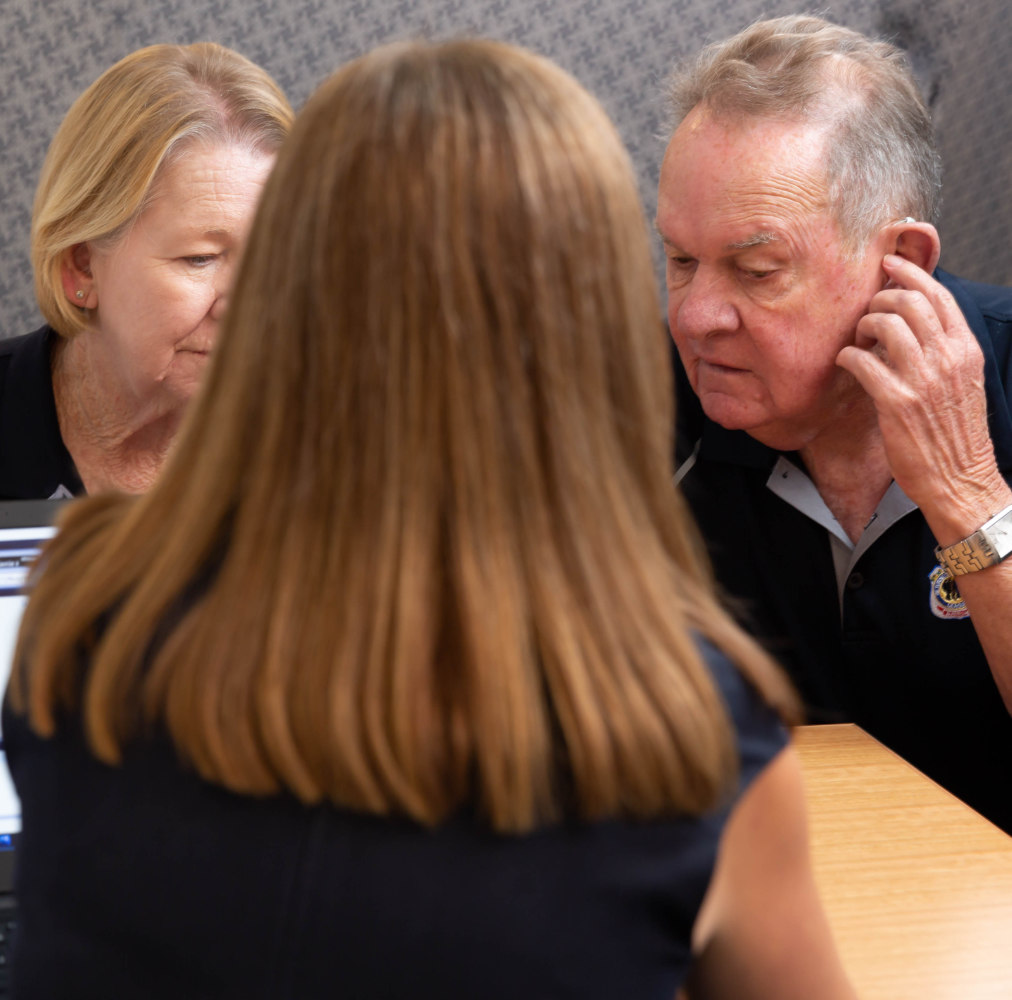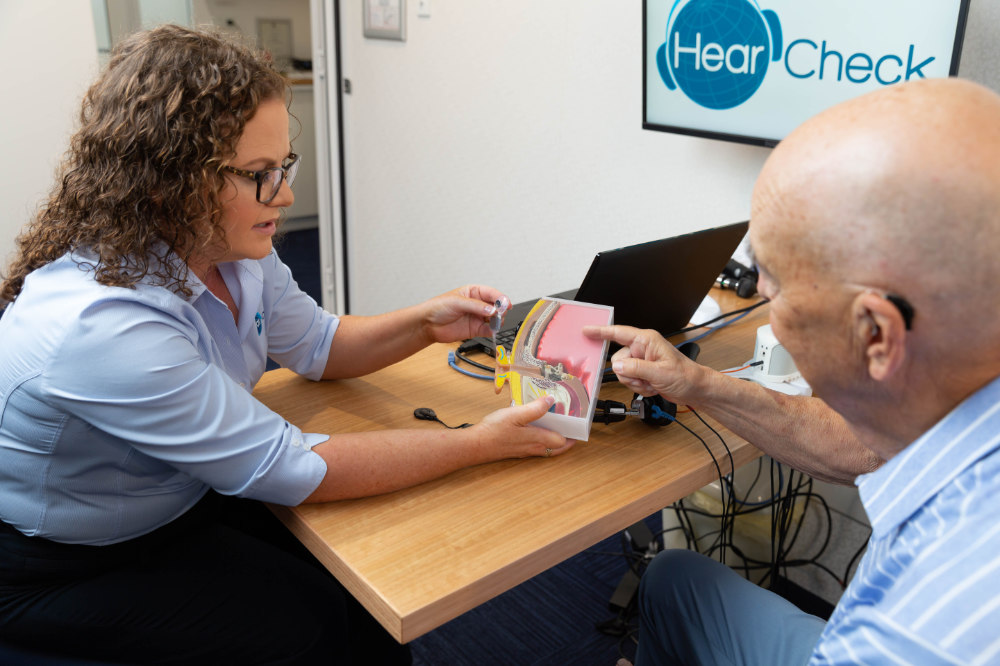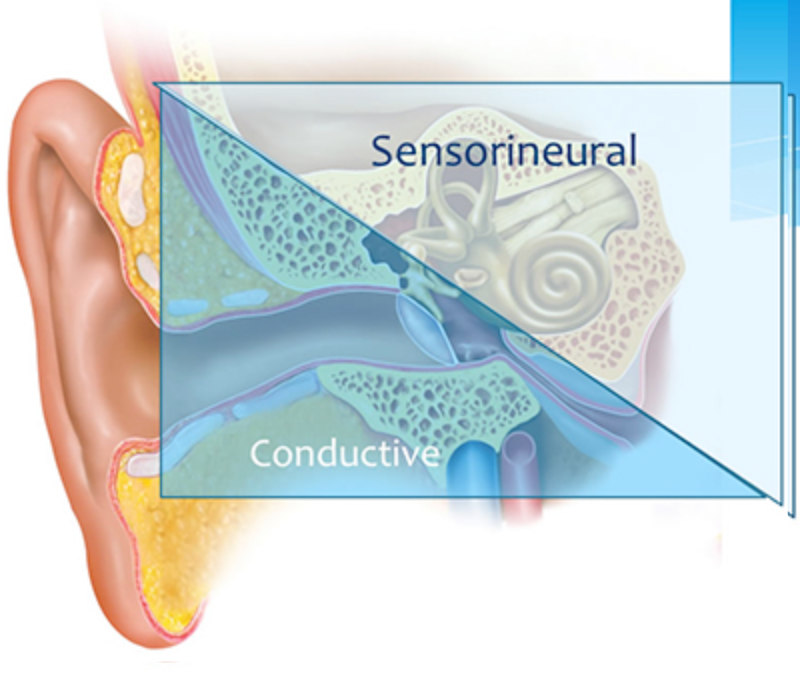About Hearing Loss
Book a Hearing TestThe Human Ear
Sound travels through the air in waves, which are first collected by the outer ear. The outer ear consists of two parts known as the pinna and the ear canal. The pinna collects sound and plays a role in determining which direction sounds come from. Sound travels via the pinna down the ear canal until it hits the ear drum – the first part of the middle ear. Inside the middle ear there are three tiny bones, called ossicles. These three bones form a chain essentially connecting the eardrum to a window on the inner ear or cochlea. As sound waves reach the ear drum, they cause it to vibrate back and forth which in turn makes the ossicles move.
The cochlea is a fluid filled organ lined with tiny hair cells. When the ossicles move and push against the window of the cochlea, waves are created in the fluid which cause the hair cells to move. The hair cells inside the inner ear convert this movement into electrical signals which can travel up the auditory nerve to the brain. It is up to the brain to then interpret the signals being presented.
Your inner ear also helps control your balance. The parts of your inner ear that help with balance share the same space and fluid as the cochlea. These parts are the semicircular canals, utricle, and saccule.
Hearing loss
Initially, the beginnings of hearing loss may seem like something you can deal with by simply turning the TV up louder or asking friends to repeat themselves. But the effects of hearing loss are more than physical and will impact more than you might think. Undiagnosed hearing loss can lead to withdrawal, depression and sadly even the perception from family that someone is losing their ability to think independently or dementing. Research on the impacts of hearing loss include:
- Hearing loss can have a negative impact on your ability to learn, socialise and enjoy life.
- People with hearing loss are more likely to miss important information in meetings and phone calls and make mistakes at work.
- Hearing problems can lead to avoidance or withdrawal from social situations, social rejection, and loneliness.
- Friends often avoid talking to people with hearing loss because of the increased difficulty communicating.
- People with uncorrected hearing impairment can earn less than people who hear normally.
- Undiagnosed hearing loss can lead to cognitive decline, and is associated with dementia.
Causes of hearing loss
Hearing loss can occur for many reasons during our lifetime and at any age. Generally speaking, the presence of hearing loss indicates that there has been some damage to the outer, middle, or inner ear or sometimes in the auditory nerve pathway to the brain.
Sometimes hearing loss is present from birth. In other circumstances, and for most people, hearing loss develops over time as a result of the ageing process. However, exposure to loud noise, the result of an illness, an accident, or even exposure to toxic drugs or chemicals can also cause hearing loss.
Types of Hearing Loss
There are three general types of hearing loss known as Conductive, Sensorineural, and Mixed hearing loss – a combination of both.
Conductive hearing loss is caused by problems that occur in the outer and middle ear. This can prevent sounds from progressing through to the inner ear. The most common causes of a conductive hearing loss are a build-up of wax in the ear canal, a perforated ear drum, fluid in the middle ear space, and damaged middle ear bones (ossicles). Conductive hearing loss is often treatable.
Sensorineural hearing loss occurs when the tiny cells or nerve endings in the inner ear get damaged. This hinders the sound from being transmitted effectively to the brain. The causes of sensorineural hearing loss include exposure to drugs that are toxic to the ear, Meningitis, Meniere’s Disease, excessive noise exposure and most commonly the natural process of ageing. In most cases, a sensorineural hearing loss is permanent.
A Mixed hearing loss is the term used when a patient presents with some degree of both conductive and sensorineural hearing losses.
Hearing health
Studies have shown that the effects of hearing loss are cumulative. Just as muscles grow weak from lack of use, the brain loses its ability to process sounds and recognise speech without regular auditory stimulation. By the time someone finally acknowledges their hearing loss is real, they may have already lost the full appreciation of the sounds and music they once enjoyed.
To prevent the debilitating impacts of hearing loss, as soon as you suspect your hearing may be declining, or are noticing signs that your spouse, partner or friend is simply not hearing as well as they once were, we encourage you and invite you to make a hearing health appointment.
Audiologists at Hear Check are University trained and provide a thorough hearing evaluation and objective, independent advice. Hear Check Audiologists will guide you and will be with you every step of your hearing health journey.
Types of Hearing Assessments
Our hearing assessments are comprised of a battery of different tests. Each one is designed to examine a different part of your hearing anatomy to pinpoint the exact location of any hearing difficulty within the auditory system and painlessly determine what can and cannot be heard, across varying pitches of sound. All test results are explained to ensure full understanding of the findings as well as recommended next steps.
We provide the following diagnostic hearing assessments:
For Adults
• Pure tone audiometry
• Tympanometry
• Acoustic Reflex testing
• Speech Audiometry
• Cochlear Implant Candidacy
• Tinnitus assessment
• Hyperacusis assessment
• Misophonia assessment
• Cochlear function assessment
• Assistive Technology Assessments
• Hearing in noise assessments
For Children & Infants
• Pure tone audiometry
• Visual Reinforcement Audiometry
• Tympanometry
• Acoustic Reflex testing
• Speech Audiometry
• Cochlear Implant Candidacy
• Tinnitus assessment
• Hyperacusis assessment
• Misophonia assessment
• Cochlear function assessment
• Central Auditory Processing Assessment (CAPD)
• Assistive Technology Assessments
• Hearing in noise assessments
Call us today to book a comprehensive hearing assessment with one of our Audiologists on 07 5493 9001 or click here to complete our online form.





